
Community
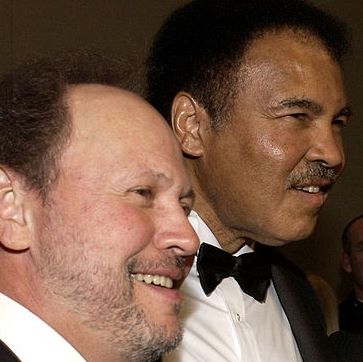
Ali loved Jews & asked Crystal to eulogise
Published
8 years agoon
By
adminANT KATZ
Writing in Forward this weekend, Benjamin Ivry says Ali has been accused of having “frequently clashed with the Jewish people”. The truth, however, is far more complex – as became clear in researching this article.
Ali was raised as a Baptist, joined the Nation of Islam in 1964 and later converted to Sunni Islam and ultimately to Sufism. However, he always saw his religion as just that, and not politics.
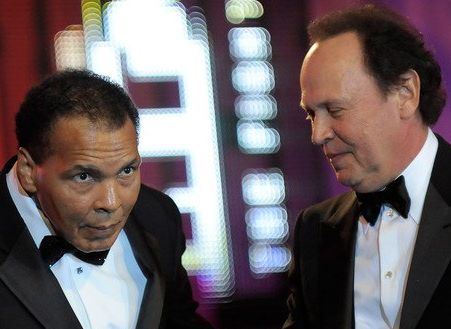
RIGHT: Ali and Crystal in 2011
In 2013, Ali’s boxing promoter Bob Arum told The Jewish Telegraph that he had to confer with Elijah Muhammad, leader of the Nation of Islam, before signing the boxer. Arum said Ali was never anti-Semitic towards him. “He was anti-white for sure, but never anti-Semitic,” Arum was quoted as saying.
Ali’s devoted assistant trainer and corner-man, Drew Bundini Brown, was already converted to Judaism when he and Ali met. The two were inseparable friends and he even wrote some of the Ali’s famous poems that he spouted to intimidate opponents.
Says Ivry: “Some Yiddishkeit might even be discerned in Ali’s interactions with the poet Marianne Moore before his 1967 bout with Ernie Terrell. As recounted in George Plimpton’s “Shadow Box”, the two poets met at Toots Shor’s Restaurant, where Ali assumed the role of yeshiva bocher with the rebbe Moore, writing a collaborative pre-match verse warning to Terrell. With typical humour, Ali could not resist poking fun at his wispy, fragile near-octogenarian guide by adding a final line: “After I am through with him he will not be able to challenge Mrs. Moore.”
Researching Muhammad Ali’s relationship with Jewry and Israel is like Googling “Is Elon Musk Jewish?” You will find apparently well-researched pieces saying both yes and no (he isn’t). Or try doing the same exercise with Madiba.
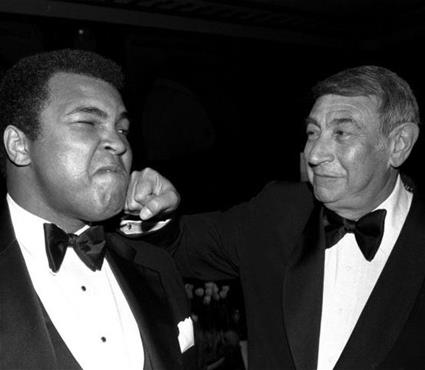 Similarly with Muhammad Ali – but the man known simply as “The Greatest” has left behind a catalogue of many bonding moments with the Jewish community dating back to the tender age of fourteen in 1970.
Similarly with Muhammad Ali – but the man known simply as “The Greatest” has left behind a catalogue of many bonding moments with the Jewish community dating back to the tender age of fourteen in 1970.
LEFT: A 1981 photo of Ali and Howard Cosell, pictured laying one on the chin of the champ at a dinner in New York (read more about them below)
As one of America’s top philanthropists, Muhammad Ali donated one million meals per year to poor people in Africa from the time he became World Champ at 22 until his death. And he has likely provided for the continuation of this legacy.
A few anecdotes that define Ali’s relationship with Jewry:
- Jewish professional propagandists and fundraisers would always approach Ali, and seldom leave empty handed.
- In December 1975, The Jewish Week reported that the then-19-year-old Ali gave $100 000 donation to the Jewish Self-Help Community Services Hillside Aged Programme of Washington Heights, New York.
- In 1998, Ali teamed up with Jewish actor Edward David Asner to deliver $1,2 million worth of medical supplies to Cuba. They met Cuban President Fidel Castro.
- Professor John C Walter (University of Washington, Seattle) said in an article on January 18, 2013: “Muhammad Ali was more that an outstanding athlete: he was a catalyst for social change, a model for positive imitation, an inspiration to generations of people of all races worldwide“.
- In January 2013, veteran Israeli journalist and author Gideon Levy wrote in Ha’aretz that “Yair Lapid says he admires Muhammad Ali”.
- In an article published in the Jewish Daily Forward on April 28, 2015, Gerald Eskenazi, a 44-year veteran sport writer at the New York Times, wrote that he once had discussion with a young Muhammad Ali. He was talking about empowerment and how historically blacks in America had been kept down. “Look at the Jews,” Ali had told Eskenazi, “they were barred from the Miami Beach. So what did they do? They bought the place.”
Relationship with Howard Cosell
Ali and top US sports broadcaster Howard Cosell (born Cohen) enjoyed a long and close friendship. The latter’s daughter, Jill, told ‘USA Today’ about Ali’s attendance at her father’s 1995 funeral: “https://www.sajr.co.za/images/default-source/People/group/ali-with-crystal-and-robin-williams-in-1999.jpg” class=”sfImageWrapper”>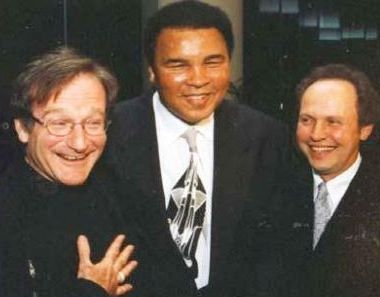
RIGHT: Ali with friends Robin Williams and Billy Crystal in 1999
“Despite fightin’ words, Muhammad Ali has Jews’ respect” was the headline of a JTA story by Adam Soclof on Ali’s 70th birthday, January 17, 2012.
“Known for his fightin’ words, Ali made no exceptions with his controversial statements about Israel. Nevertheless, the iconic athlete is revered by many Jews, including Billy Crystal.”
Muhammad Ali crafted the plan for his final tribute years ago, long before he died. This Friday, his family will honour him just like he planned, with a global celebration in his hometown.
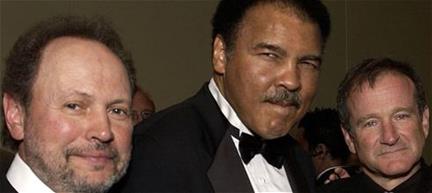
RIGHT: This 2003 picture of Williams and Crystal with Ali shows how much his Parkinson’s had aged him
Eulogists will include former President Bill Clinton, and his old friend, Jewish comedian Billy Crystal. Crystal built a career in part by doing masterful impressions of Ali. Some 24 years ago he delivered one at Ali’s 50th birthday party.
During the 1970s Crystal did spoof impressions of Ali in a tenor voice – unlike Ali’s own elegant baritone. Ali would laugh at it even though his own voice was more like that of a chazzan than Crystal’s spoofs.
Jewish adoration of Ali is also well documented in “King of the World: Muhammad Ali and the Rise of an American Hero” by long-time New Yorker editor David Remnick and William Klein’s documentary “The Greatest” (1969).
Ali’s ecumenical view on religion
“The Soul of a Butterfly: Reflections on Life’s Journey” was the title of Muhammad
Ali’s 2004 memoir, in which he wrote the following on religion:
“Over the years my religion has changed and my spirituality has evolved. Religion and spirituality are very different, but people often confuse the two. Some things cannot be taught, but they can be awakened in the heart. Spirituality is recognising the Divine light that is within us all.
“It doesn’t belong to any particular religion; it belongs to everyone,” wrote Ali. “We all have the same G-d, we just serve him differently… It doesn’t matter whether you’re a Muslim, a Christian, or a Jew. When you believe in G-d, you should believe that all people are part of one family. If you love G-d, you can’t love only some of his children.”
Attended his grandson’s barmitzvah
Muhammad Ali has nine children from four marriages, and a string of grandchildren – including a Jewish grandson, Jacob Wertheimer, who had his barmitzvah on April 27, 2012 at Rodeph Shalom in Philadelphia.
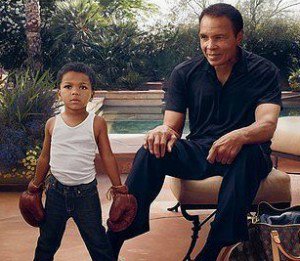 The young man is the son of Khaliah Ali, the champ’s daughter, and her husband Spencer Wertheimer.
The young man is the son of Khaliah Ali, the champ’s daughter, and her husband Spencer Wertheimer.
LEFT: Muhammad Ali played the role of zaida, too
“I was born and raised as a Muslim,” the mother said. “But I’m not into organised religion….
“My husband is Jewish. No one put any pressure on Jacob to believe one way or another. He chose this on his own because he felt a kinship with Judaism and Jewish culture.”
Grandpa, added Khaliah Ali-Wertheimer, “was supportive in every way. He followed everything and looked at the Torah very closely. It meant a lot to Jacob that he was there.”
The Congregation Rodeph Shalom is the oldest Ashkenazi shul in the Western Hemisphere.





nat cheiman
Jun 5, 2016 at 6:57 pm
‘Pity that his fellow black managers/ promoters/ religious clerics abused him and in cases like Don King, short changed him. Rev. Al Sharpton also used Ali for his own ends. ‘
Anon
Jun 7, 2016 at 7:19 am
‘I would say that the Jewish world, especially Israel, is a better place without Mahomed Ali.’
Syd Kaye
Jun 16, 2016 at 9:11 am
‘So \” Ali loved Jews\”. What a rediculous headline. Would that be ALL Jews or one or two.
I think if the writer had examined his associates and considered his name change the conclusion would have been that although his life didn’t revolve around his like or dislike of Jews it would probably have been weighted to the negative. ‘